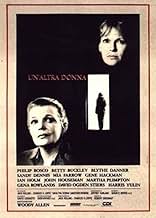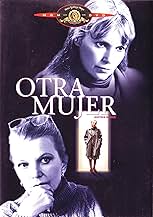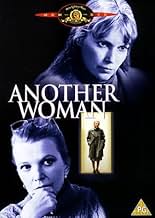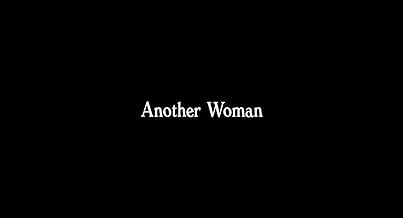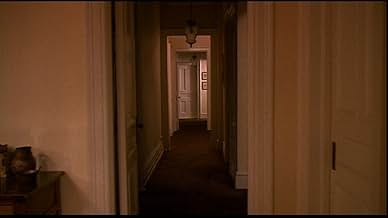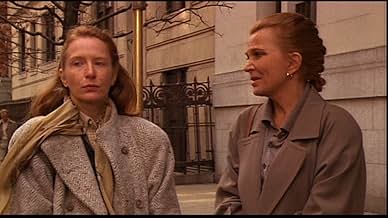Facing a mid-life crisis, 50-year-old college dean Marion Post takes a sabbatical and rents an apartment next to a psychiatrist's office to write a new book, then is drawn to the plight of a... Read allFacing a mid-life crisis, 50-year-old college dean Marion Post takes a sabbatical and rents an apartment next to a psychiatrist's office to write a new book, then is drawn to the plight of a pregnant woman seeking that doctor's help.Facing a mid-life crisis, 50-year-old college dean Marion Post takes a sabbatical and rents an apartment next to a psychiatrist's office to write a new book, then is drawn to the plight of a pregnant woman seeking that doctor's help.
- Awards
- 1 win & 3 nominations total
- Director
- Writer
- All cast & crew
- Production, box office & more at IMDbPro
Featured reviews
Woody Allen's "Another Woman" is, upon rediscovery, a film of great power and feeling. Sadly, not many people will be open to rediscovery after the initial viewing.
Gena Rowlands stars as Marion Post, a 50ish philosophy professor whose life is in order. She rents an apartment to work on her latest book. By accident, she discovers that through the heating duct, she can hear all conversations from the psychiatrist located in said building. At first, she covers the duct with cushions to block the sound, but she decides to listen in after hearing, by accident, the testimony of a young pregnant woman. This sets in motion a chain of events that changes Marion forever.
Woody has said that he originally conceived the idea as a comedy and indeed, it could be played that way (on a smaller scale in "Everyone Says I Love You"). But here, Allen resists the temptation to play it for laughs. In fact, there is not one single moment of comedy relief in his film. I think that is a wise decision. I was so absorbed by Marion's journey that comedy would have broken the mood of the film. This film is another venture into Bergmanesque cinema and "Another Woman" can compare with the very best Bergman.
Gena Rowlands hasn't had a role this good since the films of her late husband John Cassavetes. This in fact, shows another side of Rowlands; a more restrained, mannered character than the fiery, passionate characters in the Cassavetes films. It just shows the different types of roles Rowlands can play so well. She deserved an Oscar nomination for this.
In fact, the whole film is well cast by Allen. Gene Hackman is great in a mellow part as Marion's ex-lover. Blythe Danner makes a return to form as Marion's best friend. It is great to see Danner do what she does best, especially following the horrible "Brighton Beach Memoirs" in which she was underused. Ian Holm is superb as Marion's husband, who as Roger Ebert puts it "must have a wife so he can cheat on her". In his final film, John Houseman allows himself to appear weak and frail; quite a change from the pillar of strength in "The Paper Chase" and a good cap to a great career.
I mentioned at the beginning that not many people will be open to rediscovering "Another Woman". I think that is correct. Here are my reasons why. First, the film is deliberately paced, even with a short running time of 81 minutes. Most viewers' attention spans won't be able to tolerate the long takes Allen is famous for. Second, the film doesn't offer any instant gratification or closure. Allen's story is one of those stories that just can't have a typical happy Hollywood ending. Third, there is T&A, even though adultery plays a large part in the story. So if you're looking for a fast paced film with T$A and guns and action and a happy ending, you might as well move on.
"Another Woman" is one of those films in which rediscovery is necessary. Allen packs so much into 81 minutes that multiple viewings are necessary to absorb it all. If you make the effort to see it again, you might find that "Another Woman" is a film of great power and feeling that works better every time you see it.
**** out of 4 stars
Gena Rowlands stars as Marion Post, a 50ish philosophy professor whose life is in order. She rents an apartment to work on her latest book. By accident, she discovers that through the heating duct, she can hear all conversations from the psychiatrist located in said building. At first, she covers the duct with cushions to block the sound, but she decides to listen in after hearing, by accident, the testimony of a young pregnant woman. This sets in motion a chain of events that changes Marion forever.
Woody has said that he originally conceived the idea as a comedy and indeed, it could be played that way (on a smaller scale in "Everyone Says I Love You"). But here, Allen resists the temptation to play it for laughs. In fact, there is not one single moment of comedy relief in his film. I think that is a wise decision. I was so absorbed by Marion's journey that comedy would have broken the mood of the film. This film is another venture into Bergmanesque cinema and "Another Woman" can compare with the very best Bergman.
Gena Rowlands hasn't had a role this good since the films of her late husband John Cassavetes. This in fact, shows another side of Rowlands; a more restrained, mannered character than the fiery, passionate characters in the Cassavetes films. It just shows the different types of roles Rowlands can play so well. She deserved an Oscar nomination for this.
In fact, the whole film is well cast by Allen. Gene Hackman is great in a mellow part as Marion's ex-lover. Blythe Danner makes a return to form as Marion's best friend. It is great to see Danner do what she does best, especially following the horrible "Brighton Beach Memoirs" in which she was underused. Ian Holm is superb as Marion's husband, who as Roger Ebert puts it "must have a wife so he can cheat on her". In his final film, John Houseman allows himself to appear weak and frail; quite a change from the pillar of strength in "The Paper Chase" and a good cap to a great career.
I mentioned at the beginning that not many people will be open to rediscovering "Another Woman". I think that is correct. Here are my reasons why. First, the film is deliberately paced, even with a short running time of 81 minutes. Most viewers' attention spans won't be able to tolerate the long takes Allen is famous for. Second, the film doesn't offer any instant gratification or closure. Allen's story is one of those stories that just can't have a typical happy Hollywood ending. Third, there is T&A, even though adultery plays a large part in the story. So if you're looking for a fast paced film with T$A and guns and action and a happy ending, you might as well move on.
"Another Woman" is one of those films in which rediscovery is necessary. Allen packs so much into 81 minutes that multiple viewings are necessary to absorb it all. If you make the effort to see it again, you might find that "Another Woman" is a film of great power and feeling that works better every time you see it.
**** out of 4 stars
If there is a moral to Woody Allen's ANOTHER WOMAN, it is that we should live our lives with passion, spontaneity and optimism. Ironically, these are the very elements that are noticeable missing from the film. ANOTHER WOMAN seems to be selling products it doesn't have in stock, let alone on display.
ANOTHER WOMAN is an immaculate movie; sensitively acted, concisely written and lovingly filmed. But like so many of Allen's "serious" films, it is cold and strangely impersonal. It is Woody standing back and looking at someone else's life, composing a precise picture, but with a hands-off, leave-no-fingerprints approach. It is one of those films that is so easy to admire, but very difficult to embrace. It desperately wants to touch you, but refuses to come within touching distance. The film's central character is described thus: "She's just a little judgmental. You know, she sorta stands above people and evaluates them." That is how Allen approaches his characters here, like they're specimens.
There is, of course, two Woody Allens: the comedy genius and the always aspiring dramatist. Most of his comedies are pretty good, but the best are those that let the serious Woody sneak into the film and give the material backbone, as in ANNIE HALL, MANHATTAN, STARDUST MEMORIES and DECONSTRUCTING HARRY. He allows the serious Woody to make cameo appearances in his comedies, but when he sets his sites on meaningful drama, the funny Woody is barred from the set. It is as though Allen is afraid that so much as a smile will break the mood and make people forget just how serious his intentions are. He so easily mocks intellectual thought in his comedies, that he seems to have no faith in his ability to "be serious" and mean it. As such his serious comedies are alive and filled with insight, while his serious dramas are filled with pretense. How seriously can one take a line like "I shouldn't have seduced you. Intellectually, that is."? I mean, who the heck talks like that? In his comedies, such dialogue shows how pretentious the characters are; in his dramas, it seems meant to show just how sincere the characters are.
And words are an important element of ANOTHER WOMAN. Allen's dialogue and narration is eloquent and sophisticated, but stiff and formal. Even when discussing their deepest feelings or expressing anger or reliving joyous moments in their lives, all the characters speak as though they are discussing the terms of their life insurance policies. There is a solemn emptiness to the tone of the film; even at the end, when Marion tries to make amends for past failings, she seems to be negotiating a contract, not saying "Let's start again." Such pompous droning seems designed to reflect the tone of the characters' lives; but the end result is monotonous and deadening, rather than being poetic and compelling.
The film does have a clever conceit: the always marvelous Gena Rowlands plays Marion Post, a professor of philosophy, who sublets an apartment to serve as an office where she can write her latest book. A quirk in the ventilation system allows her to inadvertently eavesdrop on the conversations going on next door. The next apartment is the office of a psychiatrist, who counts among his patients a young pregnant woman, played by Mia Farrow. The young woman discusses at length her sorrowful life and suicidal impulses. Because she identifies with the younger woman's feelings of loneliness and alienation, Marion becomes obsessed with eavesdropping on the sessions and uses the situation as a springboard for reevaluating her own life.
It is significant that just as Allen tells the story from a sterile distance, Marion reviews her life only indirectly, though voice-overs, flashbacks, dreams and even symbolic stage productions. Even her psychoanalysis is conducted through a surrogate, Farrow's character, who is rather obviously named Hope. Much of the interaction with other characters occurs in Marion's mind. And rather predictably, Marion's journey of self discovery is, well, rather predictable. She discovers -- as protagonists in this sort of film always discover -- that her successful career and her well-ordered life are a facade hiding her empty relationships and assorted personal failures. Her life of satisfied accomplishment is meaningless and the trust, love and respect she believes she shares with others are delusions. It's like IT'S A WONDERFUL LIFE in reverse: Just as the angel Clarence acts as George Bailey's conscience to show him how valuable his life has been, Hope acts as Marion's conscience to reveal how empty her life as become.
ANOTHER WOMAN has a counterpart in Allen's 2003 film, ANYTHING ELSE; another film with an obvious doppelganger. The former is about a woman who encounters her younger alter ego and reevaluates her past choices, while the latter is about a young man whose encounters with his older alter ego (played by Woody Allen) effects the choices that will shape his future. The same basic story is approached from opposite directions.
It's dangerous to speculate, but it seems that Allen made ANOTHER WOMAN during a time in his life when he was hugely admired for his accomplishments and he was deeply involved in a relationship with Mia Farrow and her extended family. Certainly Farrow's playing a pregnant woman and Marion's second thoughts over placing career over personal relationships seem to suggest a parallel. By contrast, ANYTHING ELSE, made a decade and a half later, finds Allen's character playing a mentor at a time when he is apparently happily married to a much younger woman, and where his status as a filmmaker is more iconic than in vogue. As such, his surrogate changes from being the central figure to the sadder but wiser voice of experience.
Both films are steeped in regret, but make an effort to end in an upbeat fashion. But while ANOTHER WOMAN is an accomplished, polished work striving for a cool perfection, it is not persuasive in its attempt to inspire us with optimism. ANYTHING ELSE is rambling and unfocused and, well, sloppy, but its optimism is honest and funny. ANOTHER WOMAN is about getting another chance, but there is no reason to believe that anything will really change in Marion's tight, introspective little life.
ANOTHER WOMAN is an immaculate movie; sensitively acted, concisely written and lovingly filmed. But like so many of Allen's "serious" films, it is cold and strangely impersonal. It is Woody standing back and looking at someone else's life, composing a precise picture, but with a hands-off, leave-no-fingerprints approach. It is one of those films that is so easy to admire, but very difficult to embrace. It desperately wants to touch you, but refuses to come within touching distance. The film's central character is described thus: "She's just a little judgmental. You know, she sorta stands above people and evaluates them." That is how Allen approaches his characters here, like they're specimens.
There is, of course, two Woody Allens: the comedy genius and the always aspiring dramatist. Most of his comedies are pretty good, but the best are those that let the serious Woody sneak into the film and give the material backbone, as in ANNIE HALL, MANHATTAN, STARDUST MEMORIES and DECONSTRUCTING HARRY. He allows the serious Woody to make cameo appearances in his comedies, but when he sets his sites on meaningful drama, the funny Woody is barred from the set. It is as though Allen is afraid that so much as a smile will break the mood and make people forget just how serious his intentions are. He so easily mocks intellectual thought in his comedies, that he seems to have no faith in his ability to "be serious" and mean it. As such his serious comedies are alive and filled with insight, while his serious dramas are filled with pretense. How seriously can one take a line like "I shouldn't have seduced you. Intellectually, that is."? I mean, who the heck talks like that? In his comedies, such dialogue shows how pretentious the characters are; in his dramas, it seems meant to show just how sincere the characters are.
And words are an important element of ANOTHER WOMAN. Allen's dialogue and narration is eloquent and sophisticated, but stiff and formal. Even when discussing their deepest feelings or expressing anger or reliving joyous moments in their lives, all the characters speak as though they are discussing the terms of their life insurance policies. There is a solemn emptiness to the tone of the film; even at the end, when Marion tries to make amends for past failings, she seems to be negotiating a contract, not saying "Let's start again." Such pompous droning seems designed to reflect the tone of the characters' lives; but the end result is monotonous and deadening, rather than being poetic and compelling.
The film does have a clever conceit: the always marvelous Gena Rowlands plays Marion Post, a professor of philosophy, who sublets an apartment to serve as an office where she can write her latest book. A quirk in the ventilation system allows her to inadvertently eavesdrop on the conversations going on next door. The next apartment is the office of a psychiatrist, who counts among his patients a young pregnant woman, played by Mia Farrow. The young woman discusses at length her sorrowful life and suicidal impulses. Because she identifies with the younger woman's feelings of loneliness and alienation, Marion becomes obsessed with eavesdropping on the sessions and uses the situation as a springboard for reevaluating her own life.
It is significant that just as Allen tells the story from a sterile distance, Marion reviews her life only indirectly, though voice-overs, flashbacks, dreams and even symbolic stage productions. Even her psychoanalysis is conducted through a surrogate, Farrow's character, who is rather obviously named Hope. Much of the interaction with other characters occurs in Marion's mind. And rather predictably, Marion's journey of self discovery is, well, rather predictable. She discovers -- as protagonists in this sort of film always discover -- that her successful career and her well-ordered life are a facade hiding her empty relationships and assorted personal failures. Her life of satisfied accomplishment is meaningless and the trust, love and respect she believes she shares with others are delusions. It's like IT'S A WONDERFUL LIFE in reverse: Just as the angel Clarence acts as George Bailey's conscience to show him how valuable his life has been, Hope acts as Marion's conscience to reveal how empty her life as become.
ANOTHER WOMAN has a counterpart in Allen's 2003 film, ANYTHING ELSE; another film with an obvious doppelganger. The former is about a woman who encounters her younger alter ego and reevaluates her past choices, while the latter is about a young man whose encounters with his older alter ego (played by Woody Allen) effects the choices that will shape his future. The same basic story is approached from opposite directions.
It's dangerous to speculate, but it seems that Allen made ANOTHER WOMAN during a time in his life when he was hugely admired for his accomplishments and he was deeply involved in a relationship with Mia Farrow and her extended family. Certainly Farrow's playing a pregnant woman and Marion's second thoughts over placing career over personal relationships seem to suggest a parallel. By contrast, ANYTHING ELSE, made a decade and a half later, finds Allen's character playing a mentor at a time when he is apparently happily married to a much younger woman, and where his status as a filmmaker is more iconic than in vogue. As such, his surrogate changes from being the central figure to the sadder but wiser voice of experience.
Both films are steeped in regret, but make an effort to end in an upbeat fashion. But while ANOTHER WOMAN is an accomplished, polished work striving for a cool perfection, it is not persuasive in its attempt to inspire us with optimism. ANYTHING ELSE is rambling and unfocused and, well, sloppy, but its optimism is honest and funny. ANOTHER WOMAN is about getting another chance, but there is no reason to believe that anything will really change in Marion's tight, introspective little life.
This is a wonderful movie but not an easy one. It mixes the present with the past and dreams with real life. You will need to see it three or four times at least to get the best out of it but it's well worth doing. Every performance is spot on, every scene has a purpose, there is no padding here. It comes as a shock to Gena Rowlands character that she is not what she thought she was, that people do not view her in the way she thought they did.She takes a journey through her life to see what went wrong with the unwitting aid of a psychiatrist and patient in the apartment next door. The film ends abruptly without a proper resolution just as life can and does. The final line of Gena Rowlands beautiful narration will haunt you. A masterpiece of writing and direction to say nothing of superb acting and masterful cinematography.
8sol-
Bergmanesque territory for Allen again, this is an intriguing and well directed film in Bergman's style, however unlike in some of Allen's earlier Bergman ventures this one feels like less of a copy and more so just a unique drama. The film is philosophical without the ideas seeming intangible, and some of the points are very interesting, like how the pain of others can cause one to realise one's own, and how fascinating it is to hear someone else's revelations. It is not a minute too long, and the dialogue is great, but if one was to flaw it, Allen's choice of music seems a little off-balance, the narration is a touch cold, and whilst not bad, the performances are generally rather ordinary. But all these problems are very slight, as the overall production is fascinating and thought-provoking stuff about how one reflects on oneself.
10canadude
It's worth noting that in 1978, ten years before he made "Another Woman," Woody Allen created another quiet film, a drama with prominent Bergmanesque influences. The film was called "Interiors," and it was a tribute, or an American take on Bergman's "Cries and Whispers." "Interiors" examined the relationships of three sisters and their husbands in the face of the divorce of their dominant mother and detached father. The film essentially detailed the fall of "interiors," or illusory worlds created by the dominant mother in the face of tragedy and loneliness.
"Another Woman," made ten years later, shares similar themes with "Interiors," but it is more akin to Bergman's "Wild Strawberries" than to "Cries and Whispers." It is a story of a university professor, played spectacularly by Gena Rowlands, in whom something stirs when she overhears a therapy session with a young 30-something woman who is discontent with her life. The professor, Marion, feels an emptiness rise inside her - an emptiness that had settled there years before, that she can consciously feel now. Little by little, like in "Interiors," the world she has constructed for herself, a cold, cerebral world, deconstructs.
Marion despairs, enters into conflicts with herself, and questions endlessly trying to reason her way out of her malaise. But the cure for her malaise is not rational resolution and she, realizing that her strongest characteristic (namely her rational intelligence) is not enough to untangle what worries her, finds herself entirely helpless in the face of an unraveling existence.
Her drama is very much like the drama of Professor Isak Borg from Bergman's film, a man on his way to receive a medal for his lifetime achievements. And, on the road, he also succumbs to the same malaise as Marion, the same questioning and the same painful re-evaluation. The horror shared by both Marion and Professor Borg, of course, is that despite their highly lauded accomplishments and their intellectual self-satisfaction, they feel void. There must, in other words, be something else to life than strictly intellectual work, however satisfying it may be.
In Bergman (both "Cries and Whispers" and "Wild Strawberries") and in Allen (both "Interiors" and "Another Woman") life falls under question. The entire existence is evaluated, its worth and meaning doubted. In "Interiors" and "Cries and Whispers," however, the meaninglessness pervades everything in the films - the dialogues, behaviors and even visuals. The sisters in "Interiors" shatter the mother's reality and find nothingness - they continue as they were, much like the two sisters in "Cries and Whispers" for whom the death of their young sister changed absolutely nothing, and only confirmed their beliefs about the world.
However, "Another Woman" is not as stark (though it is stark indeed at times). Marion grabs at the chance to re-evaluate the life she feels she painfully wasted and tries to start again. It's not a false choice, or a gimmick on Allen's part, but it's a true depiction of Marion's sincere desire to continue to struggle because her life does have value for her. She rediscovers a passion for the struggle and her motivation is the same curiosity that made her go through the questioning process in the first place.
"Another Woman" is a testament to the fact that Woody Allen was still at the top of his game in the late 1980s. It is a brilliant, honest and (surprisingly) warm film. It is not a remake or rip-off of Bergman's work, though it is highly influenced by him (which shouldn't seem so surprising to anyone, because Bergman himself was influenced by the most basic questions of existence). "Another Woman" is an existential film that is both uncompromising and not hopeless. It's one of my favorite Woody Allen films and it reveals to us not only a great American director, but one whose films are of worldly greatness.
"Another Woman," made ten years later, shares similar themes with "Interiors," but it is more akin to Bergman's "Wild Strawberries" than to "Cries and Whispers." It is a story of a university professor, played spectacularly by Gena Rowlands, in whom something stirs when she overhears a therapy session with a young 30-something woman who is discontent with her life. The professor, Marion, feels an emptiness rise inside her - an emptiness that had settled there years before, that she can consciously feel now. Little by little, like in "Interiors," the world she has constructed for herself, a cold, cerebral world, deconstructs.
Marion despairs, enters into conflicts with herself, and questions endlessly trying to reason her way out of her malaise. But the cure for her malaise is not rational resolution and she, realizing that her strongest characteristic (namely her rational intelligence) is not enough to untangle what worries her, finds herself entirely helpless in the face of an unraveling existence.
Her drama is very much like the drama of Professor Isak Borg from Bergman's film, a man on his way to receive a medal for his lifetime achievements. And, on the road, he also succumbs to the same malaise as Marion, the same questioning and the same painful re-evaluation. The horror shared by both Marion and Professor Borg, of course, is that despite their highly lauded accomplishments and their intellectual self-satisfaction, they feel void. There must, in other words, be something else to life than strictly intellectual work, however satisfying it may be.
In Bergman (both "Cries and Whispers" and "Wild Strawberries") and in Allen (both "Interiors" and "Another Woman") life falls under question. The entire existence is evaluated, its worth and meaning doubted. In "Interiors" and "Cries and Whispers," however, the meaninglessness pervades everything in the films - the dialogues, behaviors and even visuals. The sisters in "Interiors" shatter the mother's reality and find nothingness - they continue as they were, much like the two sisters in "Cries and Whispers" for whom the death of their young sister changed absolutely nothing, and only confirmed their beliefs about the world.
However, "Another Woman" is not as stark (though it is stark indeed at times). Marion grabs at the chance to re-evaluate the life she feels she painfully wasted and tries to start again. It's not a false choice, or a gimmick on Allen's part, but it's a true depiction of Marion's sincere desire to continue to struggle because her life does have value for her. She rediscovers a passion for the struggle and her motivation is the same curiosity that made her go through the questioning process in the first place.
"Another Woman" is a testament to the fact that Woody Allen was still at the top of his game in the late 1980s. It is a brilliant, honest and (surprisingly) warm film. It is not a remake or rip-off of Bergman's work, though it is highly influenced by him (which shouldn't seem so surprising to anyone, because Bergman himself was influenced by the most basic questions of existence). "Another Woman" is an existential film that is both uncompromising and not hopeless. It's one of my favorite Woody Allen films and it reveals to us not only a great American director, but one whose films are of worldly greatness.
Did you know
- TriviaUnlike most actors and actresses in Woody Allen's movies, Gena Rowlands was allowed to read the entire script before taking the part.
- GoofsWhilst it is true that the tune of Gymnopédie No. 1 is played at the beginning of the film, it is not the piano version but rather the orchestral version orchestrated by Debussy. For some unknown reason, Debussy changed the numbers of the Gymnopédies: thus the orchestral version of Gymnopédie No. 3 bears the tune of Gymnopédie No. 1!
- SoundtracksGymnopédie No 1
Music by Erik Satie
Performed by Orchestre de la Société des Concerts du Conservatoire
Conducted by Louis Auriacombe
Courtesy of EMI Pathé-Marconi/Capitol Records Special Markets
- How long is Another Woman?Powered by Alexa
Details
Box office
- Budget
- $10,000,000 (estimated)
- Gross US & Canada
- $1,562,749
- Opening weekend US & Canada
- $75,196
- Oct 16, 1988
- Gross worldwide
- $1,562,749
Contribute to this page
Suggest an edit or add missing content


